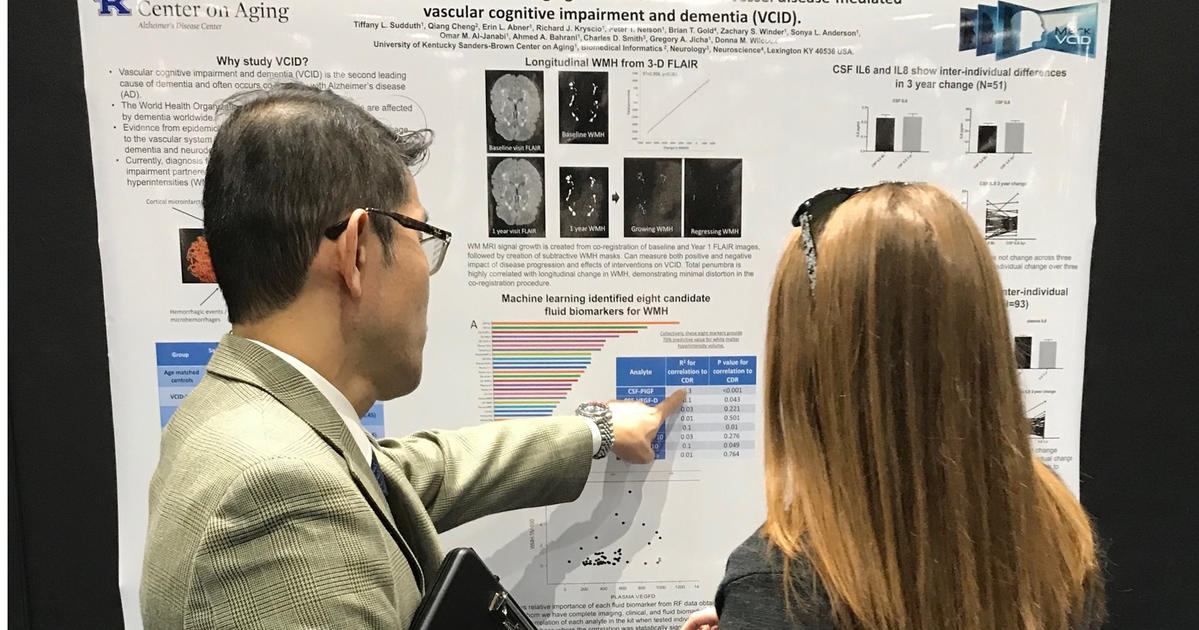
"A substance that gives pot its kick appears to reduce the brain changes associated with Alzheimer's disease – at least in mice. In mice that had been genetically tweaked to develop symptoms like those of Alzheimer's, animals that received a synthetic form of tetrahydrocannabinol for six weeks performed as well as healthy mice on a memory test, scientists reported Tuesday at the Society for Neuroscience meeting in San Diego. Meanwhile, mice given a placebo instead of THC lost the ability to remember where to find the shallow spot in a pool of water."
Posts published in “Research”

"Artificial intelligence can be used to spot Alzheimer’s six years before a patient would normally be diagnosed, a study shows. Doctors used the self-learning computer to detect changes in brain scans too subtle for humans to see. The system was able to identify dementia in 40 patients an average of six years before they were formally diagnosed."

"A new Canadian study finds that drinking coffee, particularly dark roast, may help lower your risk of developing both Alzheimer’s and Parkinson’s disease. The researchers discovered that natural coffee compounds known as phenylindanes, which emerge as a result of the bean roasting process, appear to inhibit the clumping of both beta amyloid and tau, two protein fragments common in Alzheimer’s and Parkinson’s. 'Coffee consumption does seem to have some correlation to a decreased risk of developing Alzheimer’s disease and Parkinson’s disease,' said Dr. Donald Weaver, co-director of the Krembil Brain Institute in Toronto. 'But we wanted to investigate why that is — which compounds are involved and how they may impact age-related cognitive decline.'"

LEXINGTON, Ky. (Nov. 7, 2018) — Research at the University of Kentucky Sanders-Brown Center on Aging has identified two potential ways to predict vascular cognitive impairment and dementia (VCID) – the second leading cause of dementia behind Alzheimer's disease.
About 10 percent of all dementia cases are caused by VCID, while Alzheimer's accounts for between 60 and 80 percent.
Sanders-Brown researcher Tiffany Lee analyzed 29 proteins in cerebrospinal fluid and blood plasma from 115 individuals with cognitive impairment.
From that, she was able to identify a collection of seven features that predicted cognitive impairment with an 86 percent accuracy.
The other sites are Boston University, Rush University, Johns Hopkins, University of Southern California, UCSF/UC-Davis and the University of New Mexico.

"Researchers analyzed brain tissue sourced from people who had both diabetes and Alzheimer’s. The findings suggest that some anti-diabetes drugs that these people used offered protection that kept the neurodegenerative disease from progressing as rapidly as it would have otherwise. Many elderly people with diabetes have brain changes that are hallmarks of Alzheimer’s. Previous studies have suggested that there is a link between the risk of cognitive impairment, dementia, and type 2 diabetes, and there is evidence that an insulin receptor pathway in the brain is associated with Alzheimer’s pathologies, though the mechanism remains unknown."

"Changes in the retinal vasculature may identify patients in the earliest stages of Alzheimer's disease, possibly well before the first symptoms appear, according to two studies reported here.
One study showed that patients with Alzheimer's disease had significantly reduced macular vessel density (VD) and perfusion density (PD) as compared with patients who had mild cognitive impairment (MCI) and with a group of healthy volunteers. The second study, involving participants in an Israeli registry of familial Alzheimer's disease, showed associations between brain-scan results, cognitive function, and retinal vasculature in asymptomatic individuals with a family history of Alzheimer's disease."

"Treatment with Anavex‘s investigational therapy Anavex 2-73 significantly reduces cognitive decline in people with Alzheimer’s disease and sustains their ability to perform daily activities, according to interim data from a Phase 2 extension study."

"We have all heard stories about someone we know who was seriously injured by a slip-and-fall and worried about whether or not it would be us next. The sad truth is the risk of injury after a fall only increases as we age and can be doubly as likely if we also suffer from cognitive impairment such as Alzheimer’s. Due to the toll that diseases like dementia take on our ability to perform everyday tasks, lowering the risk of a fall by any means is incredibly important."

Credit: ColiN00B Scientists have identified the molecular mechanism that leads to the death of neurons in amyotrophic lateral sclerosis (also known as ALS or motor neurone disease) and a common form of frontotemporal dementia.
Frontotemporal dementia is a form of dementia that causes changes in personality and behaviour, and language difficulties.
In frontotemporal dementia and ALS, the proteins become permanently stuck as abnormally dense gels, trapping the RNA and making it unavailable for use.
In frontotemporal dementia, the abnormal gelling was found to be caused by defects in the chemical modification of FUS.
In motor neuron disease, it was caused by mutations in the FUS protein itself which meant it was no longer able to change form.

A new international study led by University of Sydney has found that medication use increases in newly diagnosed dementia patients, particularly unnecessary or inappropriate medications.
The number of people living with dementia around the world is 50 million and in Australia is currently 425,000.
Potentially inappropriate or unnecessary medications included sleeping tablets, pain drugs, depression drugs and acid reflux drugs (proton pump inhibitors).
"Further efforts are clearly needed to support better recognition of potentially inappropriate medications to minimise possible harms and warrants interventions to minimise such prescribing.
"Deprescribing unnecessary medications may improve an individual's quality of life and can reduce unnecessary healthcare cost."
